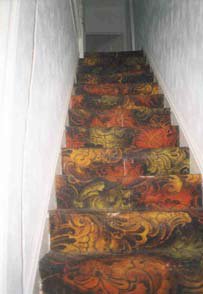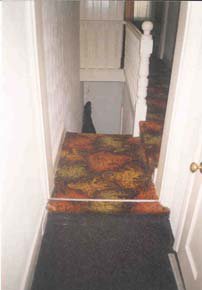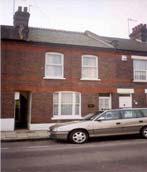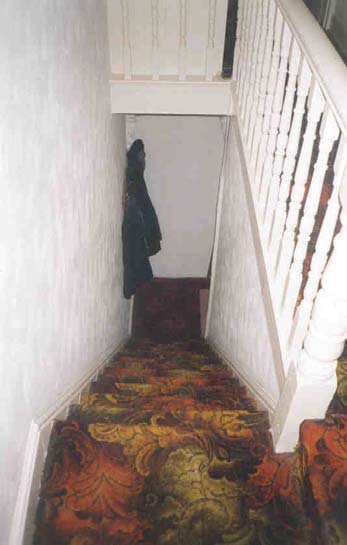



HHSRS VERSION 2
SEPTEMBER 2004
FALLS ON STAIRS ETC
HHSRS VERSION 2
Vulnerable group
Persons aged 60 years or over
Related hazards
None
A)
A/B) Plan
< up
b
c
i
Multiple hazards
Secondary hazards
i
Yes
No
Yes
No
^ up
i
coat hooks
ii
DESCRIPTION OF HAZARD/S
Dwelling:
Pre 1920 mid-terraced house
A)
Main stairs: The straight flight of 13 steps is relatively steep, having risers of over 220 mm and treads of some
220 mm deep. This flight leads from the front room to the first floor corridor serving the bathroom and a third
bedroom in the back addition. The top landing serving the two main bedrooms is one further step up from the
top of the stairs. There are no handrails on either side of the main flight. Directly opposite the foot of the stairs is
a wall on which coat hooks have been fixed. There is no direct natural lighting to the stairs or landing. The stairs
also have a loose carpet.
LIST OF RELEVANT MATTERS
LIKELIHOOD
A
OUTCOMES
a
Tread lengths
1
b
Riser heights
1
c
Variation in T&Rs
-
d
Nosing length
-
e
Poor friction
-
f
Openings - in stairs
-
g
Alternating treads
-
h-i
Lack/height handrails
3
j-l
Lack/height guarding
-
m
Stair width
-
n
Length of flight
-
o-q
Inadequate lighting etc
-
r
Door/s onto stairs
-
s
Inadequate landing
-
t
Construction/repair
1
u
Thermal efficiency
-
a
Length of flight
b
Pitch of stairs
c
Projections etc
d
Hard surfaces
e
Construction/repair
f
Thermal efficiency
# Secondary hazards
None
Key
3
2
1
-
A
1
-
2
2
-
-
A
-
Seriously defective
Defective
Not satisfactory
Satisfactory/NA
Improved
A B C D E-
G H
I
J
F
Average likelihood, outcomes and HHSRS score for falls on stairs and steps by persons
aged 60 years or more in and around pre-1920 houses, 1997-99.
HHSRS VERSION 2
SEPTEMBER 2004
HEALTH AND SAFETY RATING SYSTEM SCORES
Pre 1920 House
1 in
100
LIKELIHOOD
Low
High
Average: 218 Example
100
< 4200 2400 1300 750 420 240 130
75
42
24
13
7.5
4
2.5
1.5 >
Justification
OUTCOMES
Class I
Class II
Class III
Class IV
Justification
RATING
Although relatively steep compared to modern stairs, the dimensions of the treads and
risers are fairly typical of those found in pre-1919 terraced housing. However, the
absence of a handrail on both side of the stairs increases the likelihood of a fall above
the average for this type of dwelling. The loosely fitted patterned carpet further
increases the actual risk, but this is the owner occupier's responsibility and not a matter
for the HHSRS.
%
Average: 2.2
2.2
< 0.05 0.15 0.3
0.7
1.5
3
7
15
26
38 >
Av: 7.7
10
2.2
10.0
< 0.05 0.15 0.3
0.7
1.5
3
7
15
Av: 22.1
21.5
< 0.05 0.15 0.3
0.7
1.5
3
7
15
< 0.05 0.15 0.3
0.7
1.5
3
7
15
26
38 >
21.5
Score:
217
26
38 >
Av: 68.0
66.3
26
38 >
66.3
The stairs are designed to be carpeted and despite the presence of secondary hazards,
in the form of the wall and high level coat hooks directly opposite the foot of the stairs,
they are judged not to give significantly higher outcomes than those for the average
spread of harms.
Example Average: 169
F
A B C D E
G H
I
J
Score:
391
RATING SCORES AFTER IMPROVEMENT
IMPROVE
Justification
NEW RATING
Av: Nos
Av: 169
Likelihood to
1 in
180
Outcomes to
2.2 10.0 21.5 66.3
%
Providing handrails to either side of the stairs would reduce the likelihood of a fall and
thereby give a rating closer to the average for the age of property. Although not part of
the HHSRS, the occupiers should also be informed of the added risk posed by the
loosely fitted patterned carpet.